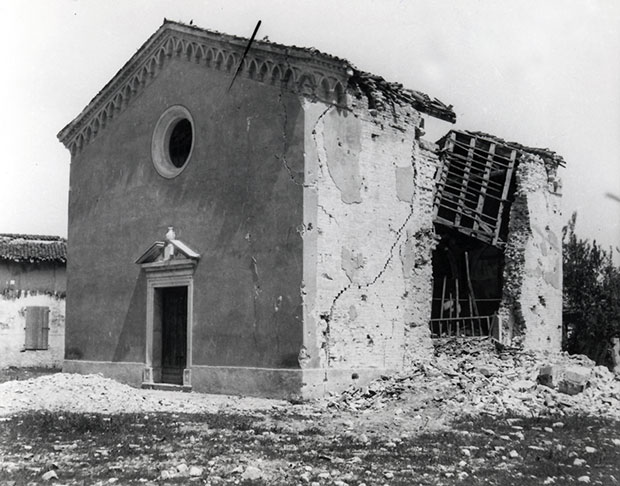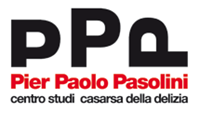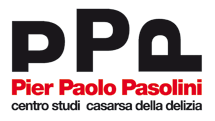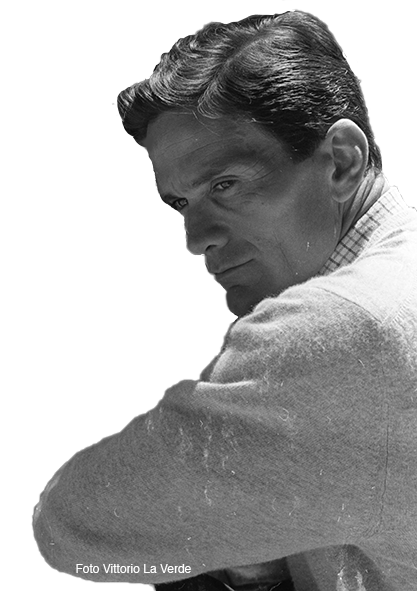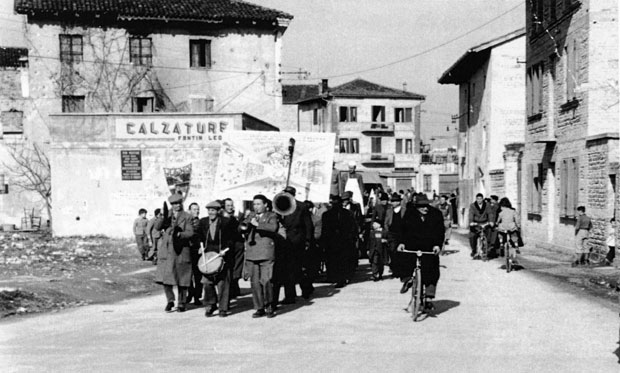
In 1943 the conflicts caused by the war, the imprisonment of the father in Africa and the unexpected drafting of Pier Paolo just a week before the armistice of the 8th September, forced Pasolini’s family (Susanna and the two children) to move permanently in Casarsa. These were difficult years for the community of Casarsa, involved in the cruelty of the war for the importance of its railway hub and the near Bridge of Delizia, over the Tagliamento River. These were the primary targets by the Allies Air force. In those years of increasing conflicts, a group of literates and friends, surrounded the poet: Pina Klac, a Slovenian violinist displaced in Casarsa, the painter Federico de Rocco, Riccardo Castellani, Cesare Bortotto and the cousin Nico Naldini. The Academiuta di lenga furlana started to outline.In April 1944 the first Strilogut di ca da l’aga was published. This is is a little almanac, a literary magazine written in the friulian of the left side of Tagliamento river. It contains proses, verses, poetic narration of everyday happenings and the first articles of literary criticism. In August of the same year the second volume of the friulian magazine was published. In the first number the poet edited a short, but very important essay, Dialet, lenga e stil (Dialect, language and style) addressed to the fellow countrymen of Casarsa. He explains how the dialect, as well as to be the original medium of everyday communication, it can become the written expression of feelings, passions and intellectual and difficult concepts. When a writer expresses himself with dialect, starts a process between history and tradition that gives the dialects the typical dignity of these languages. According to Pasolini, only the poets who are able to give the dialect a personal sign and create an individual, unique and inner style, can achieve this transition.
[blockquote author=”P.P. Pasolini, Dialet, lenga, stil, in «Stroligut di cà da l’aga» (aprile 1944), ora in Saggi sulla letteratura e sull’arte, Mondadori, Milano, 1999, vol. I, pp. 63-64″ link=”” target=”_blank”]Quant ch’i parlais, i ciacarais, i sigais tra di vualtris, i doprais chel dialet ch’i veis imparat da vustra mari, da vustri pari e dai vustri vecius. […] Nisun di vualtris al savares scrivulu, chistu dialet, e squasi squasi nencia lesilu. Ma intant lui al è vif, e se vif!, ta li vustri bocis, tai lavris da li zovinutis, tai stomis dai fantas, e al suna alegramenti di braida in braida, di ciamp in ciamp. […] La lenga a sares cussì un dialet scrit e doprat par esprimi i sintimins pì als e segres dal cour. […] Purtrop però il Friul, par tantis mai rasons, a no ’l à vut in nisun timp un grant poeta c’al ciantàs ta la so lenga e a ghi des splendour e renomansa. […]A vegnarà ben il dì che il Friul al si inecuarzarà di vei na storia, un passat, na tradision![/blockquote]
In this friulian and rural contest, many other cultural activities flourished, such as: the spectaculùs (shows) and little theatrical performances, that underlined Pasolini ‘s untimely attitude for the organization and creation of simple theatrical works. These are an anticipation of his more adult theatrical work.The historical background, in which the poet’s early theatrical activities developed, was darkened by the war. In September 1944 and March 1945 Casarsa was repeatedly bombed: in the friulian novel Atti impuri, Pasolini left us a dramatic description of the bombardment of the night between 4 and 5 March 1945.
[blockquote author=”P.P. Pasolini, Atti impuri (1947-50), postumo (1982), Milano, 1998, vol. II, pp. 78-79″ link=”” target=”_blank”]La stazione di Castiglione non distava in linea d’aria che un chilometro e mezzo. Il bombardamento, di quattro ondate successive, durò circa un quarto d’ora. Poi gli apparecchi si allontanarono, si vide a poco a poco spegnersi l’accecante lume dell’eterno, e ci decidemmo finalmente ad uscire dalla stalla, mentre gli ultimi razzi rosseggiavano per i campi. Il mondo intorno pareva sconvolto. Ma nulla, prima e ora, era paragonabile allo spettacolo che ci comparve davanti agli occhi, quando, saliti sul fienile, aprimmo la finestra che dava a settentrione, verso Castiglione. Un muro di fiamme occupava l’orizzonte per quanto era lungo il paese. Tutto il cielo e la pianura erano riverberati da quell’incendio rosso cupo, tempestoso come un mare.[/blockquote]
